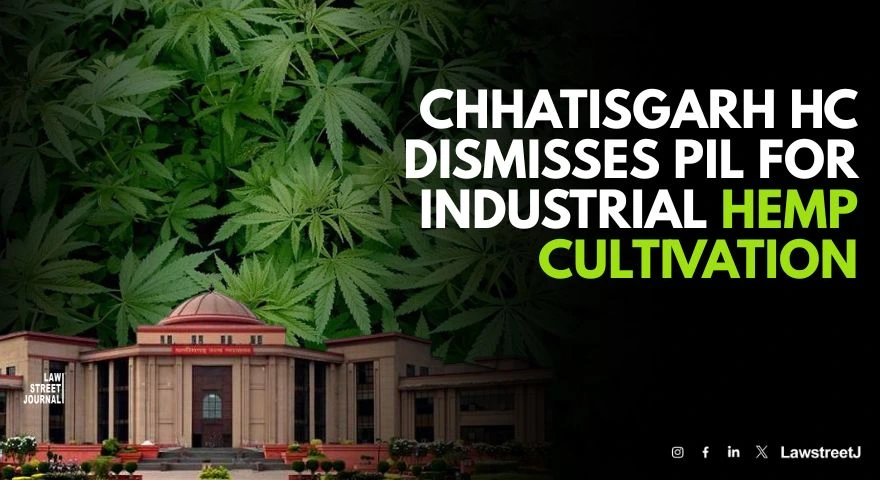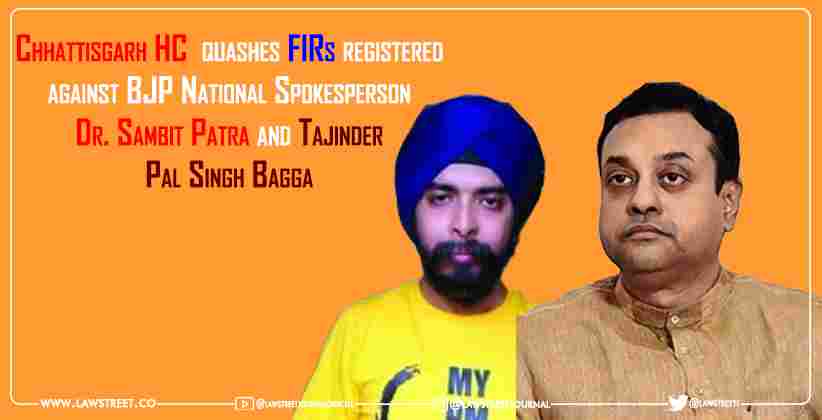Chhattisgarh: The Chhattisgarh High Court at Bilaspur has dismissed a Public Interest Litigation (PIL) filed by Dr. Sachin Ashok Kale seeking directions to the state government to permit the cultivation and development of an industrial hemp/cannabis ecosystem, ruling that the petition was not a genuine public interest matter and constituted a misuse of the judicial process.
Chief Justice Ramesh Sinha and Justice Bibhu Datta Guru delivered the judgment on July 7, 2025, in WPPIL No. 9 of 2025, emphasizing that courts cannot direct the government to make policy decisions in sensitive areas such as narcotic control.
The court addressed Dr. Kale’s petition, which sought comprehensive directions including defining industrial hemp based on THC content, authorizing cultivation through a state licensing program, and establishing an advisory board or commission to facilitate the cultivation, processing, and commercial or medicinal use of hemp.
Dr. Kale, appearing in person, argued that hemp represented a “golden plant” with significant economic, social, and environmental benefits for the citizens of Chhattisgarh. He contended that while the Narcotic Drugs and Psychotropic Substances Act, 1985 (NDPS Act), permits the mass cultivation of hemp for horticultural and industrial uses, the state government had never utilized its powers under Sections 10 and 14 to establish a licensing framework.
The petitioner highlighted various supporting evidence, including FSSAI notifications permitting hemp seed, seed oil, and flour for food use; Ministry of AYUSH guidelines for hemp oil-based medicines; and GST categorization of hemp products. He also referenced historical studies, including the Indian Hemp Drugs Commission Report of 1894, which concluded that suppressing the use of herbal cannabis would be “totally unjustifiable.”
Dr. Kale argued that the petition involved constitutional rights under Articles 21 (right to health), 29 (protection of cultural interests), 41 (right to assistance in sickness), 47 (improvement of public health), and 48A (pollution-free environment). He cited examples of other states such as Uttarakhand and Himachal Pradesh that have taken steps toward regulating hemp cultivation.
The court noted that the psychoactive effects of cannabis sativa depend on THC content, with industrial hemp (containing 0.3–1.5% THC) being unsuitable for recreational drug use. The petitioner further argued that current state policies involving the burning of cannabis plants lead to environmental pollution and biodiversity loss, while the plant could serve industrial and medical purposes.
However, the court expressed grave concern over the increasing consumption of narcotic and psychotropic substances in Chhattisgarh, stating that such substances “have evil effects on the body and mind of the person consuming it, but it ruins the entire family and society as well.”
Chief Justice Sinha observed, “Under the garb of this public interest litigation petition, this Court cannot encourage any such activity nor issue any direction to the State, which may turn out to be a disaster in the future. The reasons assigned by the petitioner to permit cultivation of cannabis in the State of Chhattisgarh are totally frivolous and baseless.”
The court emphasized that genuine PILs must address issues of public harm without any personal gain or private motive. It cited Supreme Court precedents including State of Uttaranchal vs. Balwant Singh Chaufal, Ashok Kumar Pandey vs. State of West Bengal, and Holicow Pictures vs. Prem Chand Mishra, which lay down criteria for authentic public interest litigation.
The judgment underscored that before entertaining PILs, courts must verify the petitioner’s credentials, ensure the information provided is not vague, and confirm that the matter reflects gravity and seriousness. Courts must balance the need to prevent wild allegations with the need to curb public mischief or mischievous petitions driven by oblique motives.
Justice Sinha ruled that the petitioner lacked locus standi, and that the petition was not a genuine PIL, stating, “No public interest litigation would lie if the same involves personal interests.” The court held that the reliefs sought fell within the legislative and executive policy domains, where courts cannot interfere.
The court reiterated that cannabis cultivation is generally prohibited under the NDPS Act except for specific permitted purposes through statutory procedures, and the petitioner had neither demonstrated genuine public interest nor followed appropriate legal mechanisms.
The security amount deposited by the petitioner was ordered to be forfeited as part of the dismissal.
Mr. Sangharsh Pandey, Government Advocate, appeared for the state respondents, while Dr. Sachin Ashok Kale appeared in person.
Case Title: Dr. Sachin Ashok Kale vs. State of Chhattisgarh & Ors.





![SC sets free man from case under SC/ST Act as offence not committed due to caste [Read Judgment]](/secure/uploads/2024/01/lj_4809_5ccb3cf2-6198-4e45-bb33-bfaa9b67a897.jpg)
![SC to consider forming guidelines on trial for deaf-dumb people [Read Order]](/secure/uploads/2024/04/lj_3160_483df315-842c-414c-9d28-65634ae6e806.webp)






